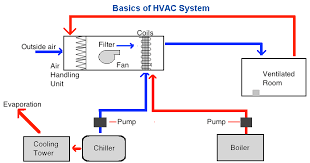
You’ve likely heard of HVAC systems and may even have one already in your home or business. But do you know what HVAC stands for or how it manages the air in a room?
HVAC stands for heating, ventilation, and air conditioning. It’s a system that provides both heating and cooling to both residential and commercial buildings. Both indoor and outdoor HVAC systems exist and they are different from the air conditioning units that most people are used to.
How does an HVAC system work?
An HVAC system uses fresh air from outside to provide high indoor air quality. The ventilation in this system is the process of replacing or exchanging air within any chosen space.
There are several health benefits that come out of this process:
- Better air quality and oxygen replenishment.
- Removal of moisture and thus prevention of mold growth.
- Removal of smoke, dust, airborne bacteria, and unpleasant odors.
- Control of excess carbon dioxide to improve air quality.
- Temperature control for a more comfortable environment.

The main parts of an HVAC system
All functions of an HVAC system are interrelated and it is one of the most complex and extensive systems in your home. If it were to stop working, you would soon notice a significant change in the temperature and air quality in your environment.
There are nine main parts of any HVAC system that you should become familiar with in order to make the most of the unit in your home or business.
1. Air Return
This is the most important part of the ventilation cycle. When the appliance sucks in air from the outside, it passes it through a filter, into the main system, and then releases clean air into a room.
2. Filter
The filter is essential for the process of ventilation. A high-quality filter is able to remove almost all impurities that may be present in the air outside. Filters should be cleaned and changed regularly to help maintain both the system and air quality.
3. Exhaust Outlets
Exhaust outlets are related to the heating aspect of your HVAC system. This is where exhaust is created in the heating process and then expelled into a safe area. It’s important to check the vent stack on a yearly basis and adjust it if needed.
4. Ducts
Ducts are the channels through which either heated or cooled air passes through. Even though you have a filter to catch impurities, ducts should also be cleaned every 2 to 5 years to make sure the airflow remains stable.
5. Electrical Elements
If there are any troubles with your HVAC system, they will usually originate in the electrical elements. This is not something that you should try and handle on your own. Instead, have a professional check the unit on an annual basis to make sure that it continues to work properly.
6. Outdoor Unit
The outdoor unit is the visible part of the HVAC system and is, of course, placed outside. It houses the fan that provides airflow and starts the whole process. It’s important to keep the outdoor unit clean at all times because vegetation and debris could take over and cause it to not function properly.
7. Compressor
The compressor converts refrigerant from a gas to a liquid and sends it to the coils. It is a type of refrigerator that cools and dehumidifies the air before it enters a room. The compressor can also be a main cause of system failure if not maintained properly, so keep your eye on it.
8. Coils
The coils work with the refrigerant to cool the air to the set temperature. Sometimes, the coils may freeze, which is another reason why you need a professional annual checkup of your HVAC system.
9. Blower
The blower is responsible for warm airflow. It will draw the air from the main section of the unit and raise it to the pre-set temperature.
You may be eligible for a no-cost HVAC system incentive!
All you need to get started is to contact us for your no-cost virtual home energy assessment.
As a proud partner of the Mass Save® program, we are able to deliver a huge range of no-cost incentives that will increase your energy savings and reduce your bills.
As residents of Massachusetts ourselves, we are delighted to be able to use our expertise to help as many people as possible live in a healthier, more energy-efficient home.
Call (781) 309-7540 or contact us to get started with a no-cost Mass Save® home energy assessment.
